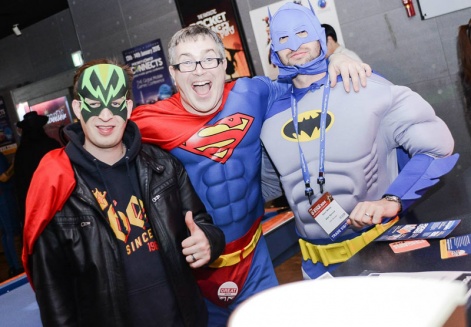Suvi Latva is a coordinator of Finnish game industry hub, Neogames.
Somebody in Finland just asked me if trade missions to game industry conferences are necessary.
Is it necessary to participate in trade missions when over 95% of the industry turnover already comes from exports?
I got irritated. Then I realised that maybe it looks goofy from outside. All these game developers are travelling around the world, just having a good time.
So maybe it's relevant to open a little the meaning and the function of trade missions, maybe even give few useful tips for the newcomers.
Who needs trade missions in a digital world?
When digital distribution and mobile app stores emerged, some people started claiming that you don't need leave your (home) office ever again. Meanwhile, as the value chain changed, publishers' traditionally dominant role transformed. Game developers were finally set free.
However, this freedom does not come without new responsibilities. Many things a publisher used to take care of, are now left in a developer's own hands: localization, PR & marketing, user acquisition, advertising etc.
Being a part of the industry network is important.
To be honest, how many game studios can handle all these necessary things by themselves?
Not that it would even be a reasonable thing to do in many cases. Of course you can go to the internet, for example to the PocketGamer.biz directory, and you will find decent amount (approx. 3700) of service providers, and then you can contact them all.
Obviously, it is just much easier to meet the most potential ones in the game industry events, like Game Connection or GDC.
Party all night along
I have seen people complaining about all the parties attached to game conferences.
But frankly, I don't know any company or CEO that lets their staff to travel internationally for a week of monkey business, especially when it costs up to €3,000 per person.

Our famous Nordic parties, for example, are first and foremost an excellent meeting point for Nordic game developers and potential partners interested in the Nordic game industry. Thus it is not a coincidence that I have heard many stories about excellent outcomes of the random meetings these parties provide.
Parties are a great opportunity to meet very good contacts and increase your own network.
Networking
Smooth networking is often challenging. It is easier with the pre-booked meeting systems that many events offer or after few (not more) beers in a networking event. I have also heard critics saying that Finns network only with themselves even when abroad.
Parties are a great opportunity to meet very good contacts.
But the thing is, it so much easier to get the right contact from the fellow colleagues than just try catch one randomly from a huge crowd.
Of course you should also try that sometimes.
Presence
There are still a relatively small amount of people involved in the game industry. Being a part of the industry network is important.
Visiting at least some of the international events regularly gives you an opportunity to have some face time and share your latest news and upcoming goals with others. It proves that you are still doing meaningful and interesting stuff. It keeps the buzz around you alive.
Learning and reflecting
When industry professionals get together, you can learn a lot from them just by hanging with them, asking for feedback and listening what they have to say.

Go to the lectures. There is not one truth and therefore they many times provide a lot to learn.
Game industry events are one of the best ways to absorb the current state of the industry from a wide perspective, maybe even see a bit of its future.
Simple tips for trade mission
Over the last nine years I have participated or run a countless number of trade missions. Based on my experiences from them, I would like to share these simple tips with you;
Be prepared
- Practice your 20 second elevator pitch. Think about your USP.
- Sleep enough beforehand. Networking is easier when you are not tired.
- Prioritize: What is your main mission for this event? Who do you want to meet and what do you want to have from the event?
- Book your meetings beforehand (at least 2-3 weeks before the event). Keep your focus on your main mission for the event.
- Find, book and sign in to the parties/networking events beforehand (2-3 week before the event).
- If you are aiming to get everything (lectures, expo, meetings, parties etc.) from, for example, GDC San Francisco, you will fail. You need to be realistic with your own schedule.
- Don't overbook your calendar. You need to have time for ad hoc meetings, lunch and to recover.
- Have enough business cards. Don't leave them at home.
In action
- Pitch your product. You might get very valuable feedback and new ideas. Don ́t be too defensive.
- Decide what lectures you want to hear. You can't absorb everything.
- Do not ever be late for the meetings. It is disrespectful for the others and it is setting you in the bad position from the beginning.
- Take notes. You won 't remember everything next week.
- Do not sell too much. At the evening people are often already tired. You can also discuss about some general topics.
- Free alcohol doesn't mean that you have to consume it all.
- Afterparties are great for closer networking, but you can always leave rum out of your rum&coke. Do not join an afterparty, if you have your most important meeting of the week next morning at 7.30am.
- Do not be too serious. If you are just screening for the most important contacts, it might make you socially very dull and repulsive.
- Do not be a jerk, ever. Don't mock others. You never know who is a friend of whom.
- Have fun. This is an industry of passion. People matter. They also prefer to do business with nice people.
Afterwards
- Connect in LinkedIn with relevant contacts
- Follow-up with an email with those relevant with your mission or business (again prioritize)
- Do your own assessment. Did I get what I wanted from the trade mission? What went well and what was not so successful?
In conclusion, I would say that participating in a game industry trade mission is very efficient if you do it properly. And it can still be a very fun thing to do. In practice, doing business and raising money requires networks and partners.
And still, even at this digital era, actual face-to-face contacts are very meaningful.






















